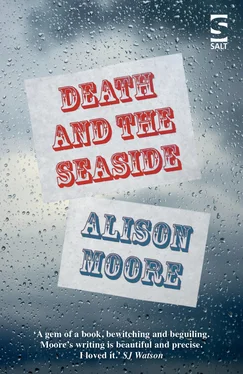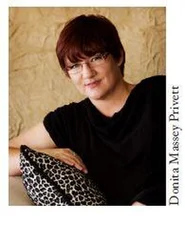‘Yes,’ said Bonnie.
Her father looked at Sylvia and said to her, ‘I hope you’re doing the driving. Don’t let that one behind the wheel!’ He pointed at Bonnie. ‘If you drive,’ he said to Bonnie, ‘you’ll crash! Or else clear the roads first,’ and he put a hand up to his mouth, making it into a loudhailer through which he bellowed, ‘Clear the roads!’ He sat back, laughing.
Bonnie’s mother came in, brushing her hands off on the front of her apron, which said, ‘I’M THE BOSS!’ She said to Bonnie’s father, ‘Have you spoken to her about quitting her job?’
‘I’m sure they’ll struggle on without her,’ said Bonnie’s father.
‘That’s not what I meant. I mean she’s talking about quitting, again , and with nothing lined up, nothing to go to.’
Bonnie remembered then to say to her mother, ‘Sylvia said you used to know each other, when I was little.’
‘I thought you looked familiar,’ said Bonnie’s mother, but at the same time she was clearly struggling to place Sylvia.
Bonnie said to Sylvia, ‘How did you say you knew Mum?’
‘Do you know,’ said Sylvia, ‘I wonder if I made a mistake about that?’
‘No,’ said Bonnie’s mother, looking hard at Sylvia. ‘You do look familiar. But I can’t think… Which school did you go to?’
Twenty questions later, Bonnie’s mother was still none the wiser, and she had to go back to the kitchen to see to the meal.
‘She’s failed her test three times,’ said Bonnie’s father to Sylvia. ‘ Three times .’ He held up three fingers.
‘I passed in the end,’ said Bonnie.
‘They must have been desperate to see the back of you,’ said her father.
‘Shall we watch the tennis?’ said Bonnie, but her father had the remote control.
‘Where’s your lavatory?’ he asked, and when Bonnie directed him through the kitchen, he took the remote control with him.
Now that they were alone, Sylvia turned to Bonnie and said, ‘Are you all set for Monday?’
‘Pretty much,’ said Bonnie, who had not actually started packing but planned to do so first thing in the morning, after visiting the launderette.
‘Have you managed to print out that new section of your Seatown story yet?’
‘I have,’ said Bonnie. ‘The printer’s working again.’
‘Oh good,’ said Sylvia. ‘And have you written any more?’
‘No,’ said Bonnie. ‘I was going to think about it last night, but I fell asleep instead.’
‘All right,’ said Sylvia, ‘well, give me what you’ve written and then I can read it before we go. I can’t wait to read it.’
‘I’d rather not,’ said Bonnie. ‘Not just yet.’
Her mother called from the kitchen, ‘Bonnie! I think you’ve got mice!’
‘Excuse me,’ said Bonnie.
‘Please,’ said Sylvia, gesturing towards the kitchen door.
Bonnie left the room, saying to her mother, ‘I wondered if I had. I thought I’d heard something scratching.’
When Bonnie returned to the lounge, Sylvia said, ‘I’d better go, dear.’
‘It looks as if some mice got in,’ said Bonnie.
‘All right,’ said Sylvia, as she picked her way past the road signs’ metal legs. ‘Let me know if you see them.’ As she passed through the kitchen, Sylvia peered into the pot that was bubbling away on the stove. ‘That smells delicious,’ she said.
‘The recipe’s just there,’ said Bonnie’s mother, nodding towards it while she stirred. ‘If you give me a minute, I’ll copy it out for you.’
‘There’s no need,’ said Sylvia, who had her phone in her hand and was angling the screen over the page of text. She took a photo. ‘Got it,’ she said.
‘I’m sure I do know you,’ said Bonnie’s mother. ‘I just can’t think how . Who’s your dentist?’
‘I really do have to go,’ said Sylvia, moving towards the back door. ‘I must finish my packing. Ah!’ she exclaimed, looking at the table with folding legs, which had come out from under the stairs and was now getting in the way in the kitchen. ‘I’ll take this off your hands,’ she said, picking it up. It was lightweight but long, and Bonnie took one end of it and helped Sylvia to steer the table through the doorway and into the passageway. Bonnie felt like someone in a gag trying to get a ladder through a series of doorways, someone like Stan Laurel, who was always in some kind of trouble, some kind of foolish danger.
‘All right,’ said Sylvia, when they were standing on the pavement at the front of the house. ‘This will do, you can put it down here.’
‘I can bring it inside,’ said Bonnie. ‘I can help you get it up the stairs.’ She had never seen inside Sylvia’s part of the house.
‘No,’ said Sylvia, ‘this is just fine. You can leave it with me now. You’d better be getting back — your dinner will be waiting for you.’ She looked at her watch. ‘I’m looking forward to our trip,’ she added. ‘I’ll be here with the hire car at nine o’clock on Monday.’
When Bonnie got back to the kitchen, she found the light off, the stove off. Her mother called through from the lounge, ‘We started without you.’ Bonnie went through and her mother indicated the dish on the floor. ‘Help yourself,’ she said.
‘I don’t know how you can live like this,’ said her father, balancing his full plate on his knees. ‘Have you not got a table?’
‘Funnily enough,’ said Bonnie, ‘I’ve just helped Sylvia take a table out of here.’
‘Of course you have,’ said her father.
They ate, and when they had all finished, Bonnie reached for her parents’ empty plates. ‘Let me take those,’ she said.
‘No,’ said her mother. ‘These are my good plates, I don’t want you to break them.’
Bonnie’s mother took the plates through to the kitchen and Bonnie said, ‘Do we want afters?’
‘What have you got?’ asked her father.
Bonnie went and had a look in the fridge, and in the freezer compartment, and in her biscuit tin. ‘I’ve got biscuits,’ she said.
‘What sort of biscuits?’ asked her father.
‘Broken,’ said Bonnie. ‘I got a kilogram.’
‘I think we’ll just go,’ said her mother, who had washed up the plates and was packing them away, along with everything else that she had brought with her.
Bonnie walked her parents to their car. Bonnie’s mother, after getting in and closing her door, wound down her window to say, ‘Have a good trip!’ and Bonnie’s father, behind the wheel, shouted up at Sylvia’s flat, ‘Don’t let her drive!’ There was no sign of Sylvia though; there were no lights on.
Bonnie returned to the flat, to the lounge, where she switched on the television and sat and watched the tennis. She always meant to follow Wimbledon, but somehow she never did, not all the way through to the end.
Her eyes followed the ball across the net, to and fro, like someone following a hypnotist’s swinging pocket watch, to a background murmur of commentary. The game had a familiar lulling, rhythmic quality, but at the same time, underlying the tennis whites and the strawberries and cream, there was muscle and ferocity and steely-eyed tenacity.
The tennis finished while Bonnie was in the kitchen, boiling the kettle. She took her cup of tea back into the lounge and settled down again in front of the television to watch Blade Runner . She had seen the film before, but this, it turned out, was a different version: the Director’s Cut. With one brief shot spliced into the middle of another scene and lasting only seconds, the Director’s Cut introduced into the narrative a subtle but vital difference: Deckard’s mental image of a unicorn running through the mist suggested that Deckard himself was a Replicant. It was unsettling, as if this must also have been true in the other version, as if this had been part of the narrative all along but without Bonnie ever having seen it, despite sitting through the whole film. Those few seconds made all the difference in the world, changing the meaning of Deckard finding the silver paper origami unicorn at the end of the film. How disturbing it would be, she thought, to discover, just like that, that you were not what you thought you were, that you were not real. And what had happened to her happy ending? In the Director’s Cut, you no longer saw Deckard and Rachael driving off into the future. All that was just gone. ‘That’s not how it ends!’ said Bonnie to the screen. She watched the closing credits, after which there was sometimes something more, something extra.
Читать дальше












